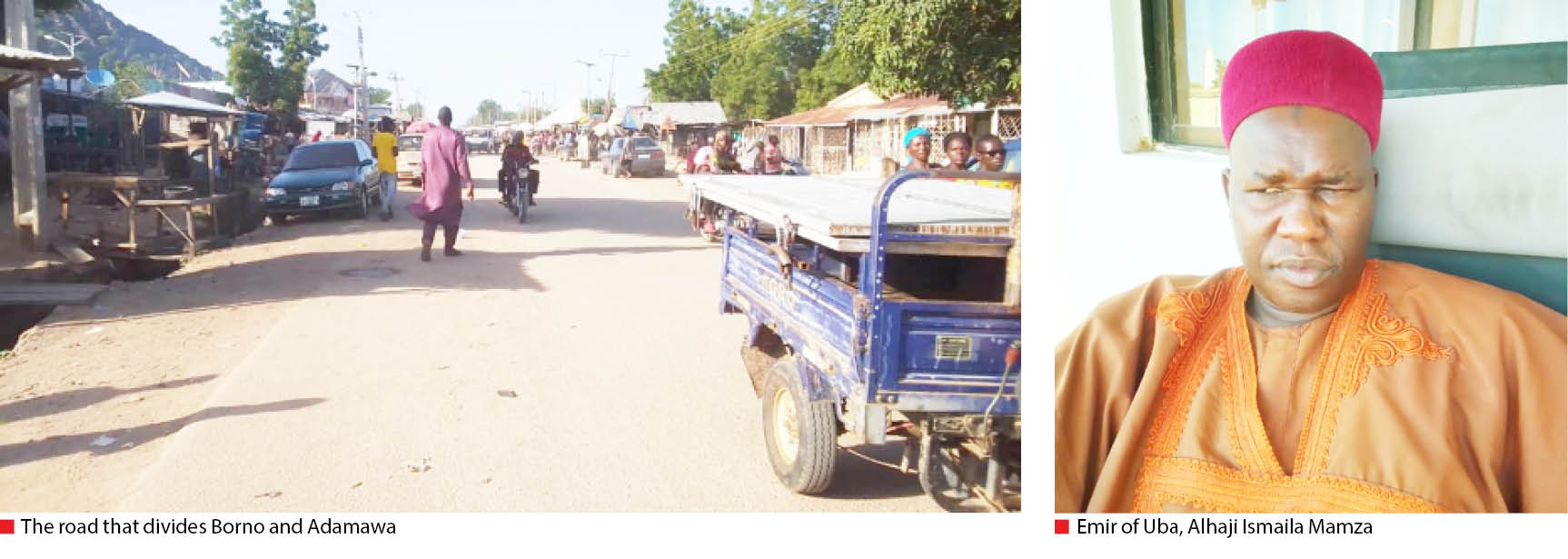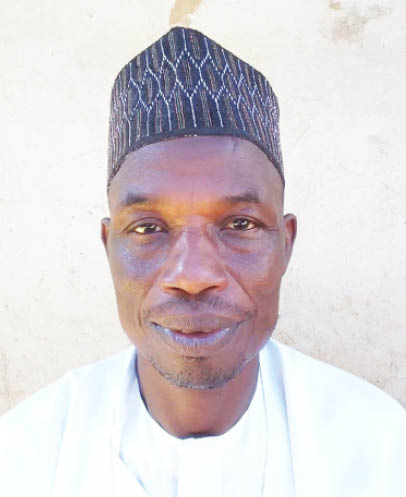The wonders of Uba – a town split between Adamawa and Borno
The 400km highway connecting Yola and Maiduguri, the capitals of Adamawa and Borno states respectively, cuts through the heart of Uba town, demarcating a physical boundary between the two northeastern states. In the last 47 years, the single-carriage road that extends to Maiduguri through Gwoza charted a new beginning, defining indigeneship, limits of authority and […]

The 400km highway connecting Yola and Maiduguri, the capitals of Adamawa and Borno states respectively, cuts through the heart of Uba town, demarcating a physical boundary between the two northeastern states.
In the last 47 years, the single-carriage road that extends to Maiduguri through Gwoza charted a new beginning, defining indigeneship, limits of authority and control of resources, after leaving one half of the town in Borno and the other in Adamawa in an amazing fashion that fascinates visitors.
It is a case of one town split between two semi-autonomous federating units, at times governed by rival political parties and historically belonging to two warring empires, Sokoto Caliphate and Borno empire, yet residents coexist peacefully and interact as dwellers of a single indivisible town, sharing markets, schools, hospitals and even football teams.
Driving along the road from Yola, Uba sits around half way at 200 km driving distance. On reaching there, visitors are first greeted by plethora of sign boards that seem to provide contradictory information. To the right, all sign boards welcome visitors to Adamawa and to the left, Borno.
- Insecurity: Bauchi rep raises alarm over heightened killings, kidnapping
- INEC raises alarm over violence in Bayelsa, Imo, Kogi
“This road defines everything in this town, this side is Uba-Borno or Uba-Askira. Just cross the road and you are in Uba Gongola, now Uba-Adamawa. You know Adamawa was created from the defunct Gongola State,” explained a resident.

Splitting of Uba town
According to an article by Yakubu Abdullahi Yakubu, an author who holds the title of Wakilin Tarihi of Adamawa Emirate, Uba town which is populated by Fulani, Marghi and other smaller ethnic groups has its history traced back to the beginning of 19th Century during the era of Sokoto jihad when a Fulani leader from Mallawa clan, Ardo Muhammadu Mola, migrated from Borno Empire to settle there.
Uba had been a district under the defunct Adamawa Native Authority with 38 wards and villages until the 1976 Local Government Reform and the creation of states which saw the town coming under Borno State, a development Marghis accepted wholeheartedly as an opportunity to slip away from the dominance of Fulani.
For a similar reason, the Fulanis wanted to remain in the newly created Gongola State (now Adamawa State) resisting to be subjected to the Kanuri majority in Borno State. Both Borno and Gongola were part of the North Eastern State.
Following numerous petitions to the then Head of State, General Murtala Muhammed, the federal government appointed a panel under Justice Irikife to look into the complaints. The panel recommended that the whole of Uba District remained in Borno State while Shani, a district in Borno be added to Gongola State, a verdict the people of Shani and a section of Uba community rejected.
Inundated by series of petitions, Murtala eventually bowed to pressure and raised another panel headed by Justice Mamman Nasir which in the end proffered a solution that would make Uba the wonder it is today.
“The Uba community, too, saw that decision by Justice lrikife as not a good idea. The people resolved to send someone every week with their grievances to the Head of State until they got a final solution. Hence, every week, they bought a flight ticket to Lagos and sent somebody with their petition. In addition, they took their campaign to the pages of the leading newspapers at that time especially, the New Nigerian and the Nigerian Standard. At a stage, the Chief of Staff, Supreme Headquarters realised that the people of Uba were a determined lot and the Federal Government decided to give them another chance,” the Wakilin Tarihi wrote.
“A committee under Justice Mamman Nasir visited Uba town and met with the people at the school’s playground. The Borno State Government sent a high-powered delegation to the meeting in over 30 vehicles but unfortunately, the Gongola State Government did not send a representative nor show any interest. Justice Mamman Nasir then drew the curtains on the matter by recommending that the highway going through Uba town should be the dividing line between Borno and Gongola States. That decision was regardless of who got more, but a physical landmark was most convenient to settle the matter. About 30 wards and villages went to Borno State, while Gongola State had the remainder of eight,” he added.
The traditional system too was split across the border. Since then, Uba-Adamawa remained a district while Uba-Borno has grown into an emirate with a first-class emir. Two villages under Uba – Husara and Mufa, were also split along the border between the two states with each having two village heads.
In an interview with Daily Trust Saturday, the Emir of Uba (Borno), Alhaji Ismaila Mamza, said the decision to divide the old Uba was taken after heated debate at the primary school ground with Justice Nasir in attendance, saying some stakeholders had kicked against the idea of a road being the border.
He noted that Fulanis used to be appointed as district heads until 1972 when Marghis being the majority ethnic group in the general district area demanded that it should be their turn and the Lamido of Adamawa agreed, appointing his (emir’s) father as the first Marghi man to head the district. The emir said greater majority of village heads were Marghis except in Uba town.
“Most villages along the border are Marghis and we have good relationship with Fulanis and other tribes. The present governor of Adamawa is Marghi, he visits me and I visit him, so there is no question of dispute because there is that affinity across the border. Uba is a blessed town; it welcomes every body from anywhere. Nowadays, we have colourful Sallah (Eid) horse riding event that is broadcast on television and shared on social media.”
Also speaking to Daily Trust Saturday, Isa Galadima who holds the title of Galadima Uba (Adamawa) believed that after the 1967 settlement, both states built more schools in their respective halves in the town, bringing the total number of public primary schools from only one to six and the number of secondary schools to three.
He noted that Borno built a clinic as well as a general hospital which remains the only tertiary health facility serving the communities and beyond while the Adamawa part of the town established its second clinic.
According to him, the old market serving Uba people falls within Gongola (now Adamawa), prompting Borno to establish its own market by the road side. The market, which deals mainly in grains, soon blossomed beyond expectation due to easy access to its location. Adamawa then established a cattle market on a similar location just across the road with the two weekly markets now complementing each other.
There’s no where the social bond manifested than in sports. Uba has two prominent football teams, Wakili FC and Arsenal FC, and both clubs have mixed squads, recruiting players and officials from the two states.
Manga Yakubu, a footballer from Adamawa who played for both clubs, said diversity of the football teams cuts across state, religion and ethnicity although the football fields were located in Uba-Adamawa.
He recalled that together with his team mates from Borno, they would play matches against other teams from Borno or Adamawa and fans often celebrate victories publicly along the same road that divide them.
Muhammad Mayas, the former administrator of Uba-Adamawa Development Area, said the physical division of the town did not affect the relationship between its inhabitants due to common history and inter marital bond, adding that inter state law enforcement has been smooth due to the fact that the police in both states are federal.
He, however, recalled a row where a judge in Uba-Borno ordered the arrest of a groom from Uba-Adamawa over a dispute that took place in the latter after a man approached the court to enforce refund of money he spent on his girl friend who then ditched him to marry the suspect. Following his intervention, Mayas said the judiciary eventually faulted the judge and had him transferred.
Alh Ibrahim Chinanda, a car dealer and director at Chinanda Motors from Adamawa, crosses the road every morning on his way to his office located few meters away in Borno.
“My house is in Adamawa but my business is in Borno, so I pay tax to the Borno State government. As for the federal government taxes, we can pay wherever we want. Our challenge is that we are far away from the local government headquarters. Those in Adamawa have to go to Hong and those under Borno go to Askira to meet with local government officials,” he lamented.
Hassan Garba, an auto mechanic living in Borno, said his clients cut across the states while location of workshops determined the state to which mechanics in the town pay their taxes.
Elections
During elections, although candidates campaign in their respective constituencies, as voters in the same town elect different sets of representatives, a resident alleged that there were cases of desperate politicians ferrying voters from across the border to help them win elections.
The people are predominantly farmers, cultivating maize, guinea corn, ground nut, rice and vegetables. They also practice livestock production and trading.
